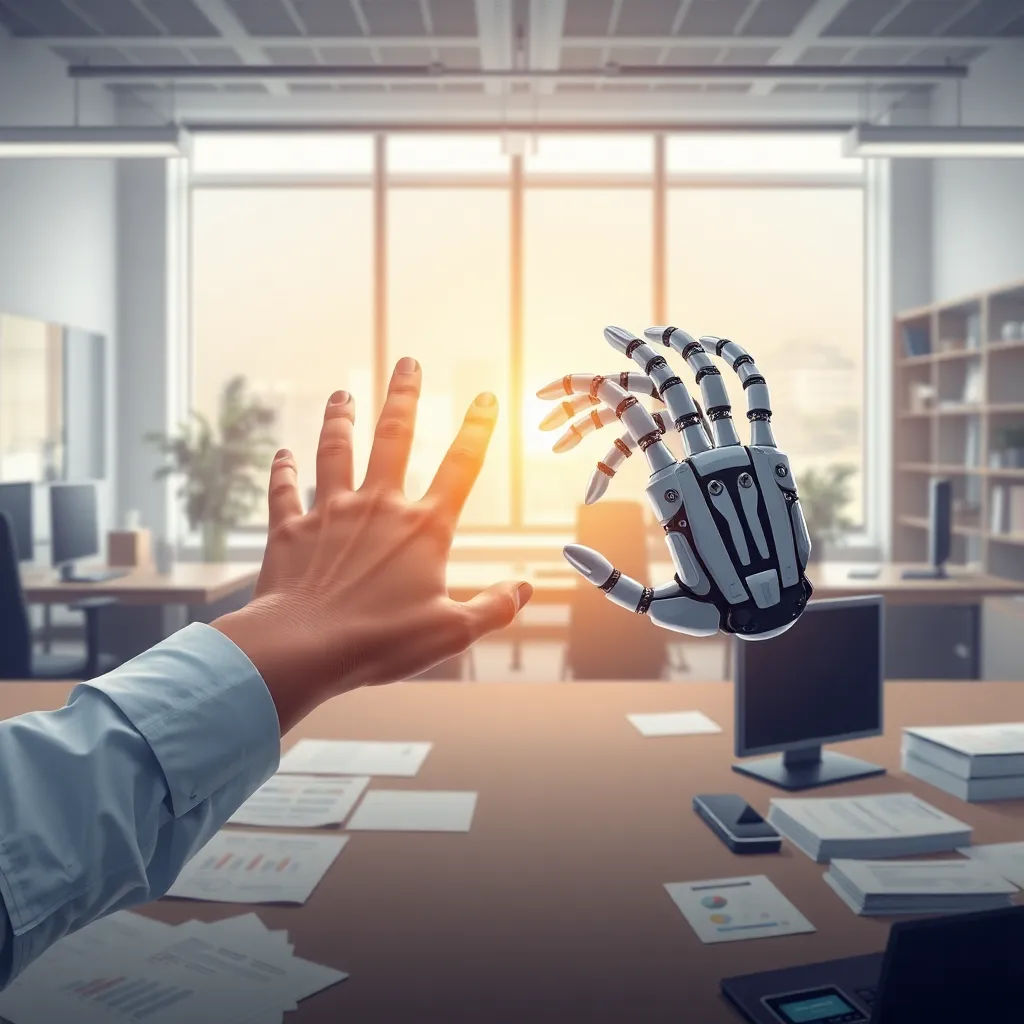By Samahir Elzaki, MSc in IT Management, Umeå University (2025)
When we think of Artificial Intelligence (AI), we often imagine machines taking over routine tasks, automating workflows, or helping us make faster decisions.
But what if AI is doing more than just helping—what if it is reshaping the way we think, decide, and perform our work?
This question became the heart of my master’s thesis at Umeå University, where I explored how Generative AI (GenAI)—particularly tools like Microsoft Copilot—is transforming workplace dynamics in the public sector.
In an era where governments are pressed to deliver smarter, faster, and more transparent services, GenAI presents both a tremendous opportunity and a profound challenge:
how do humans and AI share agency responsibly?
From Automation to Augmentation: Rethinking Delegation
In traditional digitalization projects, technology is often seen as a tool—something external that executes human instructions.
Generative AI changes that equation. It doesn’t just automate; it collaborates.
My research revealed that when employees in a Swedish municipality began using Copilot, they didn’t simply hand off routine tasks. Instead, they redefined what delegation means.
People began to distinguish between tasks that could be safely delegated to AI (like summarizing reports or generating drafts) and those that required human sensitivity, empathy, or professional identity—what I call “emotionally anchored tasks.”
This selective delegation wasn’t just practical; it was psychological.
Users were learning to “dance” with AI—negotiating control, trust, and creativity in real time.
The Dance of Delegation: A New Framework
By conducting eight in-depth interviews with employees and digital transformation officers, I used the Gioia methodology to code and interpret narratives of human–AI interaction.
The findings showed that agency was becoming hybrid—a blend of human intent and algorithmic suggestion.
What emerged from the data was striking: employees weren't simply "using" Copilot as a passive tool. Instead, they were engaged in what I call hybrid delegation—a dynamic process where procedural tasks flow to AI while humans retain evaluative control. Think of it as strategic task partitioning: Copilot transcribes meetings, drafts emails, and summarizes documents, but humans curate, contextualize, and inject authenticity.
Instead of asking, “Can AI do this task?”, employees started asking, “Should AI do this task—and how do I guide it?”
This subtle shift signals the rise of prompt engineering literacy—a new organizational skill where employees learn to communicate effectively with AI systems to achieve desired outcomes.
Trust, Accountability, and the Ethics of Delegation
Trust in AI didn’t emerge all at once; it was iterative and fragile.
Employees calibrated their trust based on repeated experiences—testing the AI’s reliability, adjusting their expectations, and reflecting on their own sense of competence.
This process mirrors the way trust develops between colleagues, not machines.
As one participant put it, “It’s like having a new coworker—you don’t fully trust them until you’ve seen what they can do.”
But this human–AI partnership also raised important ethical questions.
Who is accountable when AI-generated content contains errors or biases?
How do we ensure transparency when decisions are partly shaped by an opaque algorithm?
In public institutions—where trust, fairness, and accountability are foundational—these questions aren’t optional; they define the legitimacy of AI adoption itself.

Efficiency Meets Identity
Interestingly, while the municipality expected GenAI to enhance efficiency and innovation, employees experienced something deeper: a reconfiguration of professional identity.
Delegating cognitive work to an AI system made many reflect on what truly defines their role.
One administrator noted, “When AI drafts my reports, I have more time to think about strategy—but I also feel like I’m letting go of part of what I’m good at.”
This tension between empowerment and displacement—between doing less and becoming more—highlights the emotional and cultural dimensions of digital transformation often overlooked in managerial discourse.
Lessons for Organizations: Toward Responsible AI Integration
The study contributes to our understanding of digital transformation in three key ways:
- Human–AI agency is co-constructed. Generative AI reshapes how people assign, interpret, and own work. Delegation becomes a negotiation, not a transaction.
- Trust is a process, not a precondition. Successful adoption depends on iterative calibration, transparent design, and a culture that normalizes experimentation.
- Ethical governance must evolve. Public sector organizations need frameworks that balance AI’s efficiency gains with human oversight, equity, and data ethics.
Ultimately, the promise of GenAI lies not in replacing human intelligence but in expanding what human work can become—creative, reflective, and ethically grounded.
The Road Ahead
As I continue my academic journey, I remain fascinated by the intersection of human agency, digital ethics, and organizational design.
The next frontier is not just making AI smarter—but making our collaboration with it wiser.
The dance between humans and AI has only begun.
The rhythm we choose will define the workplaces of the future.
Meta
Author: Samahir Elzaki
Institution: Umeå University, Sweden
Published: July 2025 (https://umu.diva-portal.org/smash/record.jsf?aq2=%5B%5B%5D%5D&c=1&af=%5B%5D&searchType=SIMPLE&sortOrder2=title_sort_asc&query=Samahir+Elzaki&language=en&pid=diva2%3A1978566&aq=%5B%5B%5D%5D&sf=all&aqe=%5B%5D&sortOrder=author_sort_asc&onlyFullText=false&noOfRows=50&dswid=4696)
Reading Time: 4–5 minutes
Keywords: Generative AI, Human–AI Collaboration, Digital Transformation, Public Sector Innovation, Ethical AI, Task Delegation, Trust in AI
Hashtags: #AI #DigitalTransformation #PublicSectorInnovation #HumanAI #GenAI #EthicalAI #Research #Sweden
Suggested Cover Image: A symbolic human hand and AI hand reaching across a desk with code and municipal documents — representing partnership, not replacement.



